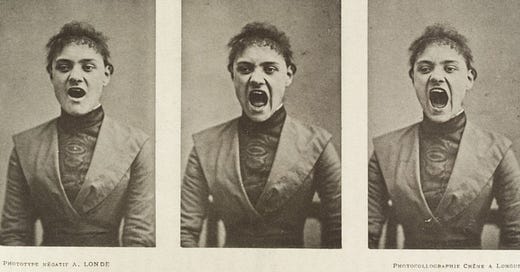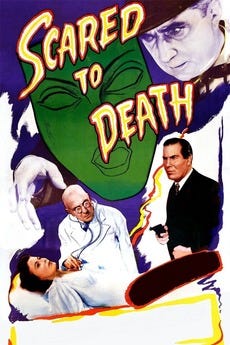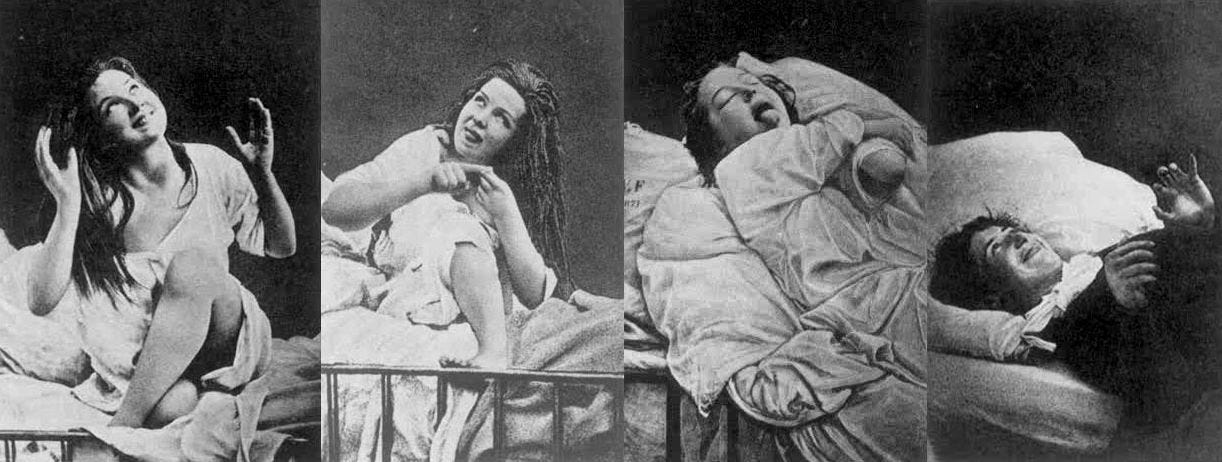(Content warning: this piece discusses forms of abuse and trauma)
I. About A Female Prostate
A few months ago, I wound up in my doctor’s office for the second or third time with a mysterious illness. I had already given the series of visits up to that point a name—“About A Female Prostate”—as if it were an absurdist comedy series coming soon to HBO. This was a coping mechanism for the constant pain and inflammation engulfing my abdomen and reproductive organs. When I first called my doctor about the pain I told her, however improbable, that I thought it was my prostate.
This was improbable because I’m a woman.
My doctor is one of the few general practitioners in my insurance network designated to provide primary care to transgender people. I had found my way to her when I decided that I wanted to start hormones. She told me that I was her first trans woman patient. I had been a little confused during my first appointment to see her pull out a tired looking package of papers stapled together and folded over many times, as if they had been stuffed in too many pockets or drawers. She called it her “cheat sheet” and said it described how to give trans women healthcare. She looked at this piece of paper to decide how many hormones I could take, what sorts of blood tests she should order, and to tell me what to expect from my transition.
In retrospect, the cheat sheet should have scared me away. But now it was two days before Thanksgiving and I was worried I would be in so much pain over the holiday weekend, while the clinic was closed, that I would end up in the ER during a global pandemic, a lone brown trans girl clutching her junk.
I had to see a resident that day because my doctor wasn’t available. She seemed genuinely concerned about my symptoms. But the resident was also worried that every time the nurse came in, she went out of her way to loudly call me “sir” and “mister,” even though my medical chart listed my name, gender, and pronouns. When the nurse left the room, the resident would furrow her brow, lean in, and say, “I think you were just misgendered. Do you want me to go get a patient advocate to be in the room with you?” She stressed those words, “patient advocate,” slowly, like an incantation. I replied no, confused at what the point was if she wasn’t going to say anything to the nurse, and so the resident went on with a rectal exam that mercifully only lasted a few seconds.
“That’s all I need to see,” she said, snapping a glove off one hand. “I think you have prostatitis.”
I waited patiently as she ordered lab tests and explained that a three week course of antibiotics was advised. I might even have to do another three weeks after this first round, she added, because prostate infections are hard to treat, being so deep in the body. I nodded quietly, getting sleepy from the rush of pain and adrenaline in my body softly receding.
As the resident punched in the prescription and hit “Send to Pharmacy” on her computer, I saw a window pop up with a big red X on it. “DO NOT PRESCRIBE” was all I could make out before she blocked my view, shaking her head. “The computer says this antibiotic would interact with spironolactone” she murmured to herself, naming the medication I took to suppress testosterone. “The combination could cause a heart attack? Okay, let me put in the other antibiotic for prostatitis.”
She was surprised when the screen flashed red again. “I need to go talk to the attending” the resident said before leaving. After ten or fifteen minutes she returned, explaining that she had talked to several doctors and the hospital pharmacist and they had eventually found me a safe antibiotic. I thanked her for being so diligent.
An hour or so later I picked up an innocuous bottle of 42 white pills from my pharmacist, who handed them to me without a word. The bottled read Ciprofloxacin. I popped the first pill when I got home, relieved that my female prostate troubles were soon to be over.
I had no idea the world of pain into which I was about to be plunged.
*
II. Anti-
Ciprofloxacin was developed by Bayer as a powerful new antibiotic in the 1980s. By 2015, it had become the fifth most prescribed antibiotic in the United States. It was also the subject of a class action lawsuit in the aftermath of the 2001 anthrax attacks in the Washington, D.C., and Baltimore area. Cipro, as it’s called for short, had been prescribed prophylactically to government workers at high risk for exposure to anthrax. A group who suffered severe effects from the antibiotic banded together to sue Bayer but were defeated in court. Still, the European Union and Canada now recommend that cipro not be prescribed except in cases where an incredibly powerful antibiotic is needed. Meanwhile, it remains one of the most prescribed antibiotics in the global south, where its relentless efficacy—it kills pretty much everything bacterial in the body—is regarded by doctors as especially “effective.”
The morning after I took my first dose, I woke up to a strange swelling in my left eyelid. Being an evangelical hypochondriac, I called my pharmacist, who said it was probably just allergies. My boyfriend soothed me, reminding me that I could relax and let the medication do its job. The next day was a holiday, after all, and I looked forward to some much needed fun after weeks of pain. Only, I didn’t feel that much better, which I thought was odd, because usually by day two of antibiotics you start to feel that miraculous abatement of infection.
That evening I started to notice that my ankles hurt. Well, not hurt exactly, but they felt tense—or was it fragile? The sensation was so strange. It was as if my tiny tendons were turning into thin, breakable glass. Still, it didn’t exactly hurt, so I tried not to think about it. An after dinner walk around the neighborhood caused my feet to swell up and I had to sleep with them on a pillow.
It was getting harder to keep the hypochondriac in my head quiet.
The next morning my ankles and feet felt normal and I chided myself for being so paranoid. While I was making coffee, my eyes glanced by chance across the prescription package for the cipro. Its list of serious warning signs included “swelling of the feet, hands, or legs,” as well as “pain in the tendons, especially in the ankles.”
I called my doctor’s office.
A few hours later, my doctor messaged me. “Hi Jules,” she wrote, “it sounds like you are not responding well to cipro. The 2 antibiotics that are considered first line therapy for prostatitis are bactrim (which cannot be taken with spironolactone) and cipro. I can treat you with bactrim, but you would have to stop the spironolactone during the period of treatment (at least 4 weeks.) Is this ok with you?”
I was eating lunch with my boyfriend when I read the message, so I would have to ask him to describe what it looked like when I put my phone down mid-sentence and burst into tears.
*
III. Detransition, Maybe
There’s a phrase that trans people use, “trans broken arm syndrome.” It refers to when you go to the doctor for something that has nothing to do with your gender, like a broken arm or a cold, and the first thing your doctor does is ask if it’s maybe because you’re trans, because you take hormones, and whether you shouldn’t just reconsider the whole thing.
My doctor, the one designated by my health plan to treat transgender people, casually asked me to detransition for an antibiotic.
After I finished crying, I wrote her back to say that I wouldn’t. Finally, she called me. On the phone she admitted that she had no idea what was wrong with me anymore and that she didn’t think it was really prostatitis since my lab work had come back normal. “We’re at an impasse,” she said of my refusal to detransition for the infection she apparently also didn’t think I had. A little stunned, I stayed silent. After a few seconds, she told me she wanted me to see a urologist because this female prostate of mine had eclipsed her expertise.
The urologist turned out to be a really nice guy, unphased by my being a woman with a busted male organ. He confirmed that I had no infection and instead had a physical problem with my pelvic floor. It turns out I didn’t need antibiotics at all—although if I did, he added, I could always safely take doxycycline.
I guess no one in my doctor’s office knew that.
The thing was, I started to realize a day or two later that the swollen left eye of mine hadn’t gone away, even after stopping cipro. Then one morning I woke up in agony. It felt like every muscle in my shoulders, neck, and head had become hard like coal. Even though I had had posture issues my whole adult life, I couldn’t fathom how it was possible for all my problem muscles to suddenly get worse than they had ever been, seemingly overnight.
Then it happened. I noticed a line across the back of my head go impossibly tight, like a rubber band stretched to its limit without breaking. I suddenly couldn’t bear any light or sound. And my entire conscious brain shorted out, leaving me barely able to speak or think. I had never felt anything like it. In fact, I had hardly ever had a serious headache that I could recall. It actually took two or three days of this before I realized I was having migraines.
*
IV. The Tao of the Floxed
If you google “getting floxed,” you’ll find an online community of “floxies,” or people who have been seriously harmed by ciprofloxacin and its siblings. They banded together at some point in the face of a lack of interest from doctors, specialists, and drug makers in their chronic suffering. It turns out that the early 2000s lawsuit was not the end of the cipro’s problems. On one of these websites, the floxies point out that despite being considered “rare,” over 60,000 complaints have been filed to the FDA about antibiotic-induced damage. I was shocked to find that I seemed to be a typical floxy, even after a measly five pills.
That tendonitis I felt, for instance, was a tell-tale sign of something going horribly wrong and it can become permanent after one course of cipro. The migraines, or tension headaches, are part of a series of neuropathic issues that can wreak havoc on people’s pain receptors, putting them in almost 24/7 excruciation. In the worst cases psychiatric conditions can develop, including severe depression, panic attacks, and psychotic breaks, though it’s not clear if those are directly caused by the antibiotic or are a secondary effect of severe neurological pain.
There are 100+ confirmed suicides of people tied to taking cipro.
You can probably guess I headed back to my doctor, who seemed surprised that a young, “healthy” person like me could suddenly develop migraines in her thirties. I explained the cipro theory and she brushed right past it, uninterested. For the following week, I tried every single thing I could do to reduce the headaches: a gluten, sugar, and alcohol free diet; curcumin, magnesium, vitamin B2 and vitamin D supplements; yoga whenever I was in minimal pain; massage; CBD; and more edibles than I had ever consumed, though I never once felt anything but frighteningly sober in pain. With a frozen ice cap on my head and a heating pad on my shoulders, I lay motionless for days, able only to achieve a kind of détente where I wouldn’t actively be in a headache, but sort of hovering on the edge of a cliff. I came to learn intimately the physical triggers that would tip things into the worst pain: a band of tiny muscles over my sinuses that apparently also wrapped around to my temples and down, through my jaw, to my neck and shoulders.
After about two weeks of stalemate, I started to notice that the intensity of my pain and the frequency of my headache attacks were both receding. Just as suddenly as my world had fallen apart, I started to see a light at the end of the tunnel. Two, then three, then five days went by without a headache. I thought the miserable story of my being prescribed a toxic antibiotic because I wouldn’t detransition was finally over.
And if it had been, I wouldn’t have bothered to write what I’m about to say next.
*
V. What He Did
Unlike a lot of people, I started high school when I was twelve. Not because I skipped any grades, but because high school where I grew up started at the eighth grade and my birthday falls at the end of December. I had always been the youngest in my class, that was nothing new. But I was excited this time because I had been admitted to a “mini school,” an accelerated academic program housed inside a public high school. Unlike a lot of people, at age twelve I had never had a friend. In elementary school the other kids stayed away from me permanently after I tried to play with the girls one day. Proud that I had now made my way somewhere different, somewhere that nobody knew me, I wondered who I could become.
That first fall of high school proved to be a descent into hell. I can almost recall the feeling, although it’s muddied and buried under years of dissociation. It was this kind of unbearable weight, like carrying around a really heavy box, except shot through with the severe, fight or flight fear you would experience only in a life or death situation. These two feelings were encrypted, trapped inside my body by a thick container of loneliness that I had learned to wear from a young age. I wandered the halls of that high school like prey in open water, always watching over my back.
There was this boy in my class. I’ll call him P. Like most the boys in the nerdy mini school, he wasn’t especially popular or attractive. Scrawny, really, a bit awkward in his posture and gait, and bearing a signature look of spiky, frosted tipped hair gelled straight up, which was totally a style at the turn of the millennium. I don’t remember what I thought about him on the first day of school, which I think means I didn’t really notice him at all in our homeroom. Still, when I close my eyes now, I can see him so clearly, thirteen years old and wearing track pants, a strange smile on his face.
In the mini school, the twenty or so of us took nearly all our classes together. Unlike most high schoolers, then, we were around the same small group of people all the time.
I can’t remember when, or how it started, but P sexually abused me for the entire five years of high school. From what I’ve been able to piece together in therapy, it started with the kinds of sexual harassment you can probably imagine as routine in high schools twenty years ago: singling me out for being a faggot, calling me one, and showing me my lack of value by humping me in front of everyone in the hallway, or leaning in to kiss me before smacking me across the face instead. At some point, though, it got way worse. I don’t have the benefit of working memories, so I want to be clear that I’m not saying any of this to indict P. I really have no idea what he thought he was doing to me, or how what he did to me affects him as an adult. What I do know is that I have to this day an intense, traumatic fear lodged in the muscles of my neck from being choked, a nausea stretching from my stomach to the inside of my throat that can make me puke in less than five seconds, and a horrifying sensation in my genitals I can only describe as butterflies in your stomach, but laced with the purest terror imaginable, all which make me sob uncontrollably and hide under a blanket, or in my bedroom closet, for hours at a time.
I have also been in EMDR (Eye Movement Desensitizing and Reprocessing) trauma therapy for much of the past year after a PTSD episode erupted during the pandemic. It has taught me a lot about the limits of memory, what changes you when you experience sexual abuse as a child, and how the body remembers what was done to it. As I started to come out of the worst of my migraines, and as I began to pay closer attention to the symptoms that would trigger them, I made what felt like a gruesome discovery: the cipro toxicity was firing the exact muscle and nerve patterns that my body had created and stored in my flesh in high school. I started to feel something I would approximate as “traumatic age dysphoria”: I was safe, at home, with a caring boyfriend and in no danger, but this adult version of me, a grown woman, was trapped inside the body of an untransitioned, terrified and sexually abused teenaged boy.
*
VI. What We Don’t Talk About
A friend more experienced in healing from chronic pain explained to me recently that when the body is locked in a fight or flight state, it can’t heal. As I’ve struggled to endure my autonomic nervous system’s lockdowns every day, I’ve felt just how impossible it is to heal and repair the muscles and nerves of my shoulders, neck, and head, leaving my massive pain, psychic and physical, untouchable. Some days are fairly good, when I do all my exercises, physical and psychic. But each night when I go to sleep, when my conscious mind turns off and I become just my body, I thrash around, twist and contort myself, throw pillows from the bed, and spend eight hours in fight or flight. I wake up each morning more exhausted than when I lay down the night before. Last night, my boyfriend saw me clenching my body and writhing around so hard that the entire bed was shaking. I’m on medical leave from my job because I can’t function, even working from home, like this.
A thirty minute walk is my biggest victory each day I can manage it.
One of the lessons that has been the most difficult for me to learn in coming to terms with being a survivor of childhood sexual abuse is that it violated the deal I made with myself as a young trans child to stay safe. I decided I would try my hardest to make it as a boy in the world because I sensed how dangerous it was to be a girl. I thought that staying a boy would protect me from the harm I could sense in the air from as far back as I can remember anytime I dared to be femme. P violated that pact, over and over, for years. And in one of the worst ways I can imagine, he showed me before anyone else could what it feels like to be treated as a trans girl in this world. He showed me how my body’s presence can become justification enough for anything a boy or a man wants, in any way he wants to take it.
I’ve lived in various degrees of fight or flight since ever since, but I thought I was making great headway. Transition has helped immensely to give me back my body, reprogram my brain, and become open to experiencing myself as lovable.
It was terrifying to think that five small pills could take that away from me, prescribed by a medical system that can’t make heads or tails of a trans woman’s reproductive pain because it frankly doesn’t care to. A system that would have prescribed me heart-attack inducing antibiotic if not for a computer algorithm. A system that then prescribed me a powerful antibiotic with potential adverse effects without informing me of the risks. And a system that asked me to detransition because I wasn’t fitting into the diagnostic and treatment rubric for a prostate—a “men’s health” problem.
My doctor hasn’t asked me since how I’m doing. And because I needed her to write me a letter for a gender affirming surgery, I haven’t brought up any of this with her. The whole thing has left me feeling lonely again, in that old, painfully familiar way, like when I was twelve.
Lately I’ve also been trying to work up the courage to join a support group for survivors of childhood sexual abuse. It’s been really hard, even on Zoom, because it feels like finally making it real, putting it out there like that. I’d much prefer to cling to the letter of my fragmented, broken memories, and say it can’t have been that bad, or other people had it worse.
What’s worse, though, is the lingering thought that of course it happened to me. Even though I tried to hide inside the skin of a boy, I was abused like the trans girl I was. And every time I try to remind myself that it’s not true, that I only think that because I’ve internalized my abuse, I remember how many doctors and nurses have misgendered me, how many didn’t listen to what I was explaining to them about my body, and how they ultimately prescribed me a medicine I didn’t need that caused me to become permanently locked into fight or flight mode, reliving my traumatic memories in the flesh every single day.
When we talk about how trans people need access to healthcare, we don’t talk about what the quality of that care is. When we talk about how trans women of color are statistically this or that way vulnerable, we don’t talk about what it feels like to be threaded through statistics and hung out to dry. When we talk about how trans women of color are strong, resilient, and leading the way to a more just world, we don’t talk about what the collateral damage is for those women.
The truth is, fight or flight kills Black and brown trans women, eventually. Until it doesn’t, not one of us is safe, not one of us is really cared for. We can’t do this on our own, and when we try, the cost is too high in the loved ones I have and will lose.
So, which will you choose? Fight? Or flight?








Abigail Shrier is a very nice, smart, thoughtful and beautiful woman. You are a nasty, dumb, abrasive and ugly man masquerading as an oppressed woman and demanding we all bow to your whims. No thinks, keep writing for 16 academics as fucked up as you and keep being irrelevant and embarrassing. BIOMALE YOU ARE AND SHALL FOREVER BE.
HI EVERYONE IM REALLY A COP BUT DONT WORRY IM A GOOD ONE I ONLY GO AFTER THE BAD GUYS. THE VAST MAJORITY OF FOLKS MAD AT SUBSTACK ARE MAINSTREAM CORPORATE JOURNALIST MAD THAT PEOPLE WONT EAT THEIR PROPAGANDA EVER AGAIN AND THEN MENTALLY ILL CAT LADYS WHO SAY ALL THE SOCIAL JUSTICY THINGS EVERY 5 MIN MON-SUN N HAVE LIKE 4 LIKES ON EVERY OTHER TWEET N SPEND 5 HOURS A WEEK WRITING A FRINGE SUBSTACK NEWSLETTER THAT ALSO NO ONE READS AND NEVER WILL AND SO IT GOES. BUT!!!! ANYWAYS IMMA MARGINALIZED AND I DEMAND PRO MONEY LIKE ALL THOSE 'BIGOTS' CUS IMMA-FIGHTN 4 EQUITY BABYYYY. EVEN THOUGH GRAHAM LINEHAM HAS NOTHING AGAINST REAL TRANS PEOPLE WHO ARE NORMAL JUST LIKE HE HAS NOTHING AGAINST OTHER REAL PEOPLE WHO ARE NORMAL HE LIKES TO HIGHLIGHT THE OVERWHELMING NUMBER OF AUTOGYNEPHILES, MENTALLY ILL CAT LADYS WHO HAVE AKATHESIA N HAVETO POST 1000'S OF TIMES A WEEK JUST TO FEEL ALIVE EVEN THOUGH THEY STRUGGLE TO GET LUNCH DATES N DONT HAVE MANY CLOSE FRIENDS N GETTING CLOSE IS SO ICKY CUS WHAT IF THEY REALIZE IM JUST A SELFISH PSYCHO WHO ONLY SAYS THE RIGHT THINGS BUT IS ACTUALLY A TERRIBLY EMPTY HUMAN BEING, AND JUST LIKE IN EVERY OTHER GROUP PEDOPHILES BC PEDOPHILIA ISNT SPECIFIC TO STRAIGHT GAY TRANS OR WHATEVER BUT I DIGRESS BABYY.
GUYSS IMMA SOOOO TIRED. FIGHTING FOR EQUITY HAS ME DRAINED, SEND MONEY TO MY CASHAPP OKAYYY.
ANYWAYS I JUST HAD SOME ROSE WE CANT HAVE GRAHAM ADDING NUANCE TO THE DEBATE, WHAT IF HE STARTS TALKING ABOUT THE CAT LADY SJW PSYCHOS. ANYWAYS LETS NOT FOCUS ON THE FAR RIGHT, THE REAL THREAT R THOSE CENTRIST, DONT TELL ANYONE BUTS ITS NOT REALLY THAT ITS JUST THAT ALL THE CENTRIST ARE MAKING VERY VALID CRITICISMS AND WE HAVE TOO MANY DETRANS AND ARE NARRATIVE IS CRUMBLING AND THE WOKE CASTLE HAS BEEN BREACHED AND MY MENTAL HEALTH STATE IS ACTUALLY THEIR FAULT.
AH FUCK IT GUYS HERE IS THE TRUTH:
JESSE SINGAL, MATT TAIBBI, BARI WEISS, ANDREW SULLIVAN, JAMES LINDSAY, CATHY YOUNG, KATIE HERZOG, SCOTT ADAMS, CHRIS RUFO, ALL THESE PEOPLE I FUCKING HATE CUS THEY R KILLING MY GRIFT. IM SO OPPRESSED GUYS AND MY LAST ACT WILL BE THE SAME AS THOSE WACKO CONSERVATIVES MOVING TO PARLER EN MASSE, IM GOING TO CONVINCE 8 OF MY LESS BRIGHT, MENTALLY ILL OR ADJACENT, PRO VICTIMS, SNAKE OIL SALESMAN WITHOUT A VALID PRODUCT THAT PEOPLE WANNA CONSUME OVER TO GHOST OR WHEREVER WHERE WE CAN JUST YELL:
TERF TERF TERF TERF UNTIL WE DIE WITHOUT GETTING SMARTER, MORE NUANCED, LESS SELF RIGHTEOUS, BETTER AT BEING HUMAN BUT ONLY BETTER AT WHAT WE PERCIEVE AS THE VIRTUE SIGNAL THAT WILL GET US AHEAD IN THIS BROKEN AND SHALLOW MERITOCRACY THAT WE UNABASHEDLY UPHOLD.
P.S. I DONT BELIEVE ANYTHING ANYMORE AND SECRETLY I LOVE BARPOD N KATIE AND JESSIE ARE THE STUFF OF WET DREAMS N IM JUST SAD MY WOKE BUBBLE SAFE SPACE BURST.
FUCK MY LIFE IM A BROKEN HUMAN JUST LIKE GRAHAM LINEHAM, JUST LIKE EVERYONE.
OH FUCK DID I JUST HAVE AN IMPORTANT INSIGHT INTO LIFE.
NAH. THOSE THOUGHTS WERE DEMONIC.
ALSO I HATE RELIGION.
REMEMBER LADYS: SELF CARE IS LOVE.
TOOTLES